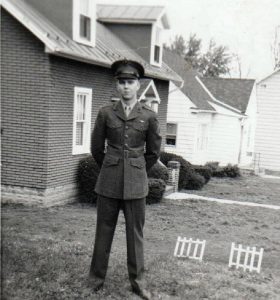James Rada, Jr.
Jim Wisotzskey considers himself the luckiest guy in the world. He is ninety-three years old and is still going strong. He has lived in Thurmont all of his life, except for a few years in the 1940s during World War II. He survived the war, barely missing several times when he could have easily been among the casualties—this is why he considers himself so lucky.
After the Japanese bombed Pearl Harbor in 1941, Jim, like many Americans, rushed off to join one of the Armed Forces. The problem was that he was seventeen years old at the time, and he couldn’t enlist without his parents’ signature.
Grinning, Jim recalled, “I know they wanted to get rid of me, but they wouldn’t sign.”
When he turned eighteen, he enlisted in the Marines and was shipped off to Parris Island. Apparently, it wasn’t as grueling a time for Jim as it was for other Marines. He actually said that he liked his drill instructor.
At the end of his basic training, all of the enlistees were taken into a hall and given a test. This was the first time where Jim’s luck helped him out.
“I was raised by a storekeeper, and the test was all about storekeeping things,” he said.
He figures he must have aced the test, because of the ninety-four Marines in his group, he was the only one sent to Quartermaster School in San Diego. The rest were sent off to fight. Once Jim learned how to be a quartermaster, he was shipped off to Hawaii.
Three days after arriving, he and the other Marines were told to line up to get their orders to ship out to an island where they needed to build an airstrip. The problem was that the Japanese were on the island and intended to remain there.
While he was in line waiting to board the plane, a bicycle messenger pedaled up with a message for the officer in charge. The officer read the piece of paper, looked at the line of waiting Marines, and cut it off at a point ahead of Jim. He and the other Marines behind the cut-off were told to return to their barracks.
Jim thought that he would just be taking another plane out the next day, but Hawaii became his duty station.
“Of that first batch of Marines that went out, only seven came back,” Jim said. “It was my name that saved me. We were alphabetical, and I’m always near the end of the line.”
Jim’s job in Hawaii was to gather orders. Each morning, he was given a list of supplies and parts that he needed to collect. Usually, he would go out to Barber’s Point to meet the incoming supply ships and see if they had what he needed. If they didn’t, he still needed to find the items. He would scrounge through junkyards, and also admitted to “borrowing” them from Navy planes without asking the permission of the Navy.
Another instance of his luck saving him was during the West Loch Disaster. On May 21, 1944, a mortar round on a landing ship exploded, which set off a chain of explosions and fires at the Pearl Harbor Naval Base. Over the next day, 6 landing ships sank, 163 people were killed, and 396 people were injured.
“We had fallout raining down on our camp for seven days,” Jim said.
The incident was kept classified until 1960, and so it is not a well-known incident from WWII. Jim could have easily been one of the casualties that day, but he was working elsewhere.
“Friends told me they saw Marines holding onto railings with their heads missing, but they were still standing,” remembered Jim.
One time where his luck failed him was when it came time to return to the states. As he was waiting to board the ship that would take him home, he got horrible stomach pains and doubled over. He was taken to sick back with an acute appendicitis, so severe that a doctor had to be brought in to operate immediately on Jim.
Meanwhile, the ship sailed without him, and it had all his papers. He was forced to spend the next three months recovering in a tent area on Hawaii until his papers made their way back to him and he could leave for California.
As the war wound down, Jim got two weeks leave, which he spent in Thurmont, getting married. He and Lilalee Caton had known each other before the war started; although, she had been fourteen and he seventeen when they met. She wrote to him while he was in Hawaii and sent him care packages. Now they were both adults and decided to marry on July 4, 1945.
The war was already won in Europe, and the focus was on ending the war in the Pacific. After his leave, Jim had to return to California for six more months. He was discharged as a sergeant at the end of the war and returned home to his wife.
He became a carpenter, and he and Lilalee raised three children. Lilalee passed away last year, but she did not leave Jim alone. Besides their three children, they have seven grandchildren, seven great-grandchildren, and one great-great-grandchild.

Jim Wisotzkey is shown in front of a display of the many puzzles he has put together and mounted as an art display at Moser Manor.


